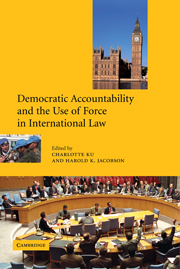Book contents
- Frontmatter
- Contents
- List of figures
- List of tables
- Notes on contributors
- Preface
- List of abbreviations
- I Introduction
- II The domestic and international context
- III Traditional contributors to international military operations
- IV Newcomers to international military operations
- V Permanent members of the UN Security Council
- 11 Russian Federation: the pendulum of powers and accountability
- 12 France: Security Council legitimacy and executive primacy
- 13 The United Kingdom: increasing commitment requires greater parliamentary involvement
- 14 The United States: democracy, hegemony, and accountability
- VI Conclusion
- Appendix A. Uses of military forces under the auspices of the UN and NATO
- Appendix B. Country participation in international operations, 1945–2000
- References
- Index
13 - The United Kingdom: increasing commitment requires greater parliamentary involvement
Published online by Cambridge University Press: 30 July 2009
- Frontmatter
- Contents
- List of figures
- List of tables
- Notes on contributors
- Preface
- List of abbreviations
- I Introduction
- II The domestic and international context
- III Traditional contributors to international military operations
- IV Newcomers to international military operations
- V Permanent members of the UN Security Council
- 11 Russian Federation: the pendulum of powers and accountability
- 12 France: Security Council legitimacy and executive primacy
- 13 The United Kingdom: increasing commitment requires greater parliamentary involvement
- 14 The United States: democracy, hegemony, and accountability
- VI Conclusion
- Appendix A. Uses of military forces under the auspices of the UN and NATO
- Appendix B. Country participation in international operations, 1945–2000
- References
- Index
Summary
The UK Constitution and military action
The use of military force by democratic states causes considerable tension between the mechanisms of democratic accountability and the traditional sovereign power of a state, through its government, to commit its armed forces overseas. In the United Kingdom, one of the oldest democracies, this tension is becoming increasingly apparent, though the weight of constitutional practice still concedes considerable latitude to the executive in making such decisions. While the existence of a mandate granted by an international organization to use armed force does not change this position in formal terms, the increased use of internationally sanctioned forces in nondefensive actions has brought the tension to a head.
In the United Kingdom, the fulcrum of the executive is the cabinet, headed by the prime minister. Major policy, including decisions on military operations and foreign policy, is hammered out in the cabinet and in various standing and ad hoc cabinet committees. Decision-making on issues of foreign affairs and the deployment of armed forces are within the prerogative power of the Crown. This signifies that executive action can be taken by virtue of the prerogative “without the authority of an Act of Parliament.” As prerogative powers, both foreign affairs and the deployment of armed forces are exercised on the authority of the cabinet or of ministers, particularly the prime minister, the secretary of state for foreign and Commonwealth affairs, and the secretary of state for defence.
- Type
- Chapter
- Information
- Publisher: Cambridge University PressPrint publication year: 2003
- 1
- Cited by

